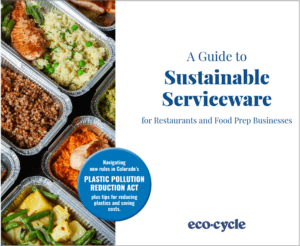How Restaurants and Other Food Establishments Can Prepare for the Ban on Polystyrene
Phase 2 of the Plastic Pollution Reduction Act goes into effect January 1, 2024, and has three components:
- Large Colorado retailers are prohibited from distributing plastic checkout bags.
- Large Colorado retailers are required to keep charging a minimum $0.10 fee per paper checkout bag.
- Retail food establishments are prohibited from distributing polystyrene foam (commonly referred to as Styrofoam®) food and beverage containers.
Note that retail food establishments may continue to use up any remaining inventory of polystyrene food and beverage containers they possess after January 1, 2024. New polystyrene food and beverage containers should not be purchased after January 1, 2024.
A Step-by-Step Guide for Food Establishments to Implement the Ban on Polystyrene Food Containers and Cups
Use this guide for implementation of the ban on polystyrene food containers and cups. For more information on implementation of the plastic checkout bag ban, refer to this page.
Step 1: Understand the ban
Polystyrene (often referred to as Styrofoam®) food and containers and cups are made from styrene, which is considered a carcinogen by the Department of Health and Human Services and the International Agency for Research on Cancer. The polystyrene foam food container and cup ban, effective January 1, 2024, applies to ALL retail food establishments in Colorado.
Step 2: Determine if your establishment is exempt or nonexempt
According to Colorado law, a retail food establishment is one that prepares or packages food for humans and provides the food to people either directly or through a delivery service. The food can be eaten on or off the premises of the food establishment. Retail food establishments include restaurants, fast food restaurants, cafeterias, schools, and prisons.
Retailers that sell only prepackaged food that they purchase from a third party and sell in its original package are exempt. Other exemptions from the ban on polystyrene food containers and cups include:
- Farmers markets and roadside markets
- Private homes and boarding houses
- Kitchens selling food products directly to consumers under the Colorado Cottage Foods Act
- Hospital and health facilities
- Childcare centers
- Hunting camps and outdoor recreation locations
- Food or beverage wholesale manufacturing, processing, or packaging plants
- Motor vehicles used solely for the transport of food
- Coffee or tea shops serving only hot beverages and pastries
- Establishments serving only prepackaged or commercially prepared food requiring no preparation other than the heating of food within its original container
- Automated food merchandising enterprises dispensing prepackaged food
- Packaging of drugs, medical devices, or dietary supplements regulated by the U.S. Food and Drug Administration
See C.R.S. 25-4-1602 for a complete list of food establishments that are exempt from HB21-1162 due to the definition of retail food establishment.
Step 3: Identify the polystyrene foam products for which you will need an alternative
Banned polystyrene containers include:
- Hinged food containers (aka clamshells)
- Plates
- Bowls
- Cups
- Trays
These items are included in the statewide ban on polystyrene food containers and cups. Note that restaurants and other food establishments may continue to use up any remaining inventory of polystyrene food and beverage containers they possess after January 1, 2024. New polystyrene food and beverage containers should not be purchased after January 1, 2024.
Step 4: Determine which food containers and cups are right for your business
What to use instead of polystyrene? Are some packaging choices better for the environment than others? How much will these alternatives cost?
Check out Eco-Cycle’s Guide to Sustainable Serviceware, which will help you navigate your serviceware choices based on their level of sustainability—some of which can save your business money. This guide is intended to be used by food retailers and municipalities around the state, and provides environmental, cost, and disposal considerations for different serviceware and packaging choices.
Inside the guide, you’ll find alternatives to polystyrene food contains and cups, including options that are:
Reusable
Consider using durable serviceware for in-house dining, or even delivery! Providing reuse choices for your customers is easier than you might think—even for smaller businesses with limited dishwashing capacity. The average savings for small businesses switching to reusables is between $3,000 and $22,000 annually! For leftovers, encourage your dine-in customers to bring their own to-go boxes or cups. For delivery, consider partnering with a third party that provides, collects, and cleans reusable food and beverage containers, such as Ozzi, DeliverZero, or r.Cup. Some municipalities offer financial incentives to businesses that switch to reusables and/or are working with companies that provide reusable to-go systems for restaurants.
Recyclable
While reducing and reusing are best, choosing products and packaging that are recyclable is the next best thing. Some materials are more recyclable than others. Aluminum, steel, and glass are all infinitely recyclable. Most single-use plastics must be landfilled, but for the relatively few plastics that are recyclable, they can go through the recycling process only once or twice. When choosing plastic to-go containers, buy #1 PETE, #2 HDPE, or #5 PP bottles, tubs, jars or clamshells. Most paper products used in the food industry are coated in plastic and are therefore not recyclable.
Compostable
While certified compostable food containers and cups are a good alternative to single-use plastics, they are only useful IF your community’s compost facility accepts them. Cities and towns along Colorado’s Front Range no longer accept compostable products in compost bins. these items now belong in the trash. If your restaurant or food establishment is located in a Front Range community, consider recyclable or reusable alternatives.

























